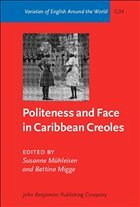Main description:
Politeness and Face in Caribbean Creoles is the first collection to focus on socio-pragmatic issues in the Caribbean context, including the socio-cultural rules and principles underlying strategic language use. While the Caribbean has long been recognized as a rich and interesting site where cultural continuities meet with new "creolized" or innovative practices, questions of politeness practices, constructions of personhood, or the notion of face have so far been neglected in linguistic research on Caribbean Creoles. Drawing on linguistic politeness theory and Goffman's concept of face, eleven mostly fieldwork-based innovative contributions critically examine a range of topics, such as ritual insults, strategic use of "bad language", kiss-teeth, the performance of homophobic threats, greetings, address forms, advice-giving, socialization and discourse, parent-child discourse, register choice and communicative repertoire in the Caribbean context.
Table of contents:
- Acknowledgements
- Politeness and face in Caribbean Creoles
- Part I: Performing rudeness and face maintenance
- The use of 'bad' language as a politeness strategy in a Panamanian Creole village
- Ritualized insults and the African diaspora
- Rude sounds
- Faiya-bon
- Part II: Face attention and the public and private self
- Greeting and social change
- Advice in an Indo-Guyanese village and the interactional organization of uncertainty
- Meaningful routines
- Forms of address in English-lexicon Creoles
- Part III: Socialization and face development
- 6;May I have the bilna?'
- Learning respect in Guadeloupe
- Notes on contributors
- Index
Politeness and Face in Caribbean Creoles is the first collection to focus on socio-pragmatic issues in the Caribbean context, including the socio-cultural rules and principles underlying strategic language use. While the Caribbean has long been recognized as a rich and interesting site where cultural continuities meet with new "creolized" or innovative practices, questions of politeness practices, constructions of personhood, or the notion of face have so far been neglected in linguistic research on Caribbean Creoles. Drawing on linguistic politeness theory and Goffman's concept of face, eleven mostly fieldwork-based innovative contributions critically examine a range of topics, such as ritual insults, strategic use of "bad language", kiss-teeth, the performance of homophobic threats, greetings, address forms, advice-giving, socialization and discourse, parent-child discourse, register choice and communicative repertoire in the Caribbean context.
Table of contents:
- Acknowledgements
- Politeness and face in Caribbean Creoles
- Part I: Performing rudeness and face maintenance
- The use of 'bad' language as a politeness strategy in a Panamanian Creole village
- Ritualized insults and the African diaspora
- Rude sounds
- Faiya-bon
- Part II: Face attention and the public and private self
- Greeting and social change
- Advice in an Indo-Guyanese village and the interactional organization of uncertainty
- Meaningful routines
- Forms of address in English-lexicon Creoles
- Part III: Socialization and face development
- 6;May I have the bilna?'
- Learning respect in Guadeloupe
- Notes on contributors
- Index

